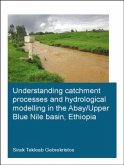Mika Sillanpää, Tonni Agustiono Kurniawan
Blue Economy
Oceans as the Economic Frontier in Industry 4.0
Mika Sillanpää, Tonni Agustiono Kurniawan
Blue Economy
Oceans as the Economic Frontier in Industry 4.0
- Broschiertes Buch
- Merkliste
- Auf die Merkliste
- Bewerten Bewerten
- Teilen
- Produkt teilen
- Produkterinnerung
- Produkterinnerung
Blue Economy: Oceans as the Economic Frontier in Industry 4.0 examines the emerging concepts related to blue economy and climate change, along with their effects on oceans. The book provides a detailed review of the current literature and includes unique case studies analyzed by experts in the field, thus offering graduate students and researchers a thorough guide with practical applications.
Andere Kunden interessierten sich auch für
![Understanding Catchment Processes and Hydrological Modelling in the Abay/Upper Blue Nile Basin, Ethiopia Understanding Catchment Processes and Hydrological Modelling in the Abay/Upper Blue Nile Basin, Ethiopia]() Sirak Tekleab GebrekristosUnderstanding Catchment Processes and Hydrological Modelling in the Abay/Upper Blue Nile Basin, Ethiopia75,99 €
Sirak Tekleab GebrekristosUnderstanding Catchment Processes and Hydrological Modelling in the Abay/Upper Blue Nile Basin, Ethiopia75,99 €![Blues Para Un Planeta Azul / Blues for a Blue Planet Blues Para Un Planeta Azul / Blues for a Blue Planet]() Juan FueyoBlues Para Un Planeta Azul / Blues for a Blue Planet20,99 €
Juan FueyoBlues Para Un Planeta Azul / Blues for a Blue Planet20,99 €![Microplastics Microplastics]() Microplastics156,99 €
Microplastics156,99 €![Fluid Inclusion Studies Fluid Inclusion Studies]() Guoxiang ChiFluid Inclusion Studies158,99 €
Guoxiang ChiFluid Inclusion Studies158,99 €![Improving Health and Nutrition Through Bioactive Compounds Improving Health and Nutrition Through Bioactive Compounds]() Improving Health and Nutrition Through Bioactive Compounds183,99 €
Improving Health and Nutrition Through Bioactive Compounds183,99 €![Advanced Transport Biofuels Advanced Transport Biofuels]() Cheng Tung ChongAdvanced Transport Biofuels310,99 €
Cheng Tung ChongAdvanced Transport Biofuels310,99 €![Extracellular Enzymes in Environments Extracellular Enzymes in Environments]() Shengyan PuExtracellular Enzymes in Environments239,99 €
Shengyan PuExtracellular Enzymes in Environments239,99 €-
-
-
Blue Economy: Oceans as the Economic Frontier in Industry 4.0 examines the emerging concepts related to blue economy and climate change, along with their effects on oceans. The book provides a detailed review of the current literature and includes unique case studies analyzed by experts in the field, thus offering graduate students and researchers a thorough guide with practical applications.
Hinweis: Dieser Artikel kann nur an eine deutsche Lieferadresse ausgeliefert werden.
Hinweis: Dieser Artikel kann nur an eine deutsche Lieferadresse ausgeliefert werden.
Produktdetails
- Produktdetails
- Verlag: Elsevier Science
- Seitenzahl: 300
- Erscheinungstermin: 1. September 2025
- Englisch
- ISBN-13: 9780443239007
- ISBN-10: 0443239002
- Artikelnr.: 69606375
- Herstellerkennzeichnung
- Libri GmbH
- Europaallee 1
- 36244 Bad Hersfeld
- gpsr@libri.de
- Verlag: Elsevier Science
- Seitenzahl: 300
- Erscheinungstermin: 1. September 2025
- Englisch
- ISBN-13: 9780443239007
- ISBN-10: 0443239002
- Artikelnr.: 69606375
- Herstellerkennzeichnung
- Libri GmbH
- Europaallee 1
- 36244 Bad Hersfeld
- gpsr@libri.de
Mika Sillanpää's research work centers on chemical treatment in environmental engineering and environmental monitoring and analysis. The recent research focus has been on the resource recovery from waste streams. Sillanpää received his M.Sc. (Eng.) and D.Sc. (Eng.) degrees from the Aalto University where he also completed an MBA degree in 2013. Since 2000, he has been a full professor/adjunct professor at the University of Oulu, the University of Eastern Finland, the LUT University, the University of Eastern Finland and the University of Johannesburg.
Section 1: Towards a sustainable blue economy and ocean governance 1.1 Blue
Economy: Oceans as a huge, sustainable, and equitable economic system 1.2
Charting a course for a sustainable blue economy. 1.3 Global pathways for a
secure and resilient blue economy 1.4 Underpinning blue economy through a
sustainable and equitable growth 1.5 Unlocking the commercial value of
oceans in blue economy 1.6 Enhancing capacity building for ocean governance
in blue economy 1.7 Transitioning to a Blue Economy in Industry 4.0 era
through digital technology in ocean management 1.8 Blue economy: the way
forward in Industry 4.0 era using digitalization of ocean governance.
Section 2. Promoting a healthy ocean that benefits everyone. 2.1 Life below
water: Health challenges and solutions 2.2 Sustainable economic, social,
and environmental strategies to achieve healthy oceans. 2.3 Keeping oceans
healthy to keep the blue economy running. 2.4 Covid-19 global pandemic:
Impacts on Blue Economy and ocean health 2.5 Turning the tide: Promoting a
sustainable ocean recovery post-Covid19. Section 3. Contribution of Blue
Economy to UN SDGs 3.1 Uncovering the roles of oceans in promoting
sustainable development. 3.2 Blue economy in the UN SDGs: Challenges and
opportunities 3.3 Ocean conservation and development to advance the UN SDGs
Section 4. Ocean: A secret weapon against climate change 4.1 Empowering
blue economy initiatives¿as solutions for climate change 4.2 Ocean as
nature-based solutions to climate change 4.3 Ocean acidification as a
physical indicator of climate change 4.4 Impacts of ocean acidification on
climate change and fisheries 4.5 Promoting sustainable, resilient and
inclusive blue economies to mitigate climate change. 4.6 How the blue
economy could save oceans from climate change? 4.7 Energy from sea waves
for climate change mitigation 4.8 Ocean-based CO2 removal: a new frontier
in blue economy for climate mitigation 4.9 Blue economy: Opportunities and
bottlenecks for green recovery Section 5. Improving ocean-based economies
5.1 Riding the wave of blue economy: An ocean of opportunity. 5.2
Strengthening sustainable ocean-based economies in coastal cities. 5.3
Shaping the future of the world's oceans through blue economy. 6.
Successful case-studies of blue economy 6.1 How archipelagic countries in
global south can harness the blue economy? 6.2 Prioritizing the blue
economy to promote North-South global initiatives. 6.3 Role of ocean
finance in transitioning to a blue economy in Asia-Pacific 6.4 Shaping a
sustainable blue economy in Southeast Asian region. 6.5 Nourishing the blue
economy in North America for sustainable development. 6.6 Ocean management
in archipelagic countries 7. Concluding remarks References
Economy: Oceans as a huge, sustainable, and equitable economic system 1.2
Charting a course for a sustainable blue economy. 1.3 Global pathways for a
secure and resilient blue economy 1.4 Underpinning blue economy through a
sustainable and equitable growth 1.5 Unlocking the commercial value of
oceans in blue economy 1.6 Enhancing capacity building for ocean governance
in blue economy 1.7 Transitioning to a Blue Economy in Industry 4.0 era
through digital technology in ocean management 1.8 Blue economy: the way
forward in Industry 4.0 era using digitalization of ocean governance.
Section 2. Promoting a healthy ocean that benefits everyone. 2.1 Life below
water: Health challenges and solutions 2.2 Sustainable economic, social,
and environmental strategies to achieve healthy oceans. 2.3 Keeping oceans
healthy to keep the blue economy running. 2.4 Covid-19 global pandemic:
Impacts on Blue Economy and ocean health 2.5 Turning the tide: Promoting a
sustainable ocean recovery post-Covid19. Section 3. Contribution of Blue
Economy to UN SDGs 3.1 Uncovering the roles of oceans in promoting
sustainable development. 3.2 Blue economy in the UN SDGs: Challenges and
opportunities 3.3 Ocean conservation and development to advance the UN SDGs
Section 4. Ocean: A secret weapon against climate change 4.1 Empowering
blue economy initiatives¿as solutions for climate change 4.2 Ocean as
nature-based solutions to climate change 4.3 Ocean acidification as a
physical indicator of climate change 4.4 Impacts of ocean acidification on
climate change and fisheries 4.5 Promoting sustainable, resilient and
inclusive blue economies to mitigate climate change. 4.6 How the blue
economy could save oceans from climate change? 4.7 Energy from sea waves
for climate change mitigation 4.8 Ocean-based CO2 removal: a new frontier
in blue economy for climate mitigation 4.9 Blue economy: Opportunities and
bottlenecks for green recovery Section 5. Improving ocean-based economies
5.1 Riding the wave of blue economy: An ocean of opportunity. 5.2
Strengthening sustainable ocean-based economies in coastal cities. 5.3
Shaping the future of the world's oceans through blue economy. 6.
Successful case-studies of blue economy 6.1 How archipelagic countries in
global south can harness the blue economy? 6.2 Prioritizing the blue
economy to promote North-South global initiatives. 6.3 Role of ocean
finance in transitioning to a blue economy in Asia-Pacific 6.4 Shaping a
sustainable blue economy in Southeast Asian region. 6.5 Nourishing the blue
economy in North America for sustainable development. 6.6 Ocean management
in archipelagic countries 7. Concluding remarks References
Section 1: Towards a sustainable blue economy and ocean governance 1.1 Blue
Economy: Oceans as a huge, sustainable, and equitable economic system 1.2
Charting a course for a sustainable blue economy. 1.3 Global pathways for a
secure and resilient blue economy 1.4 Underpinning blue economy through a
sustainable and equitable growth 1.5 Unlocking the commercial value of
oceans in blue economy 1.6 Enhancing capacity building for ocean governance
in blue economy 1.7 Transitioning to a Blue Economy in Industry 4.0 era
through digital technology in ocean management 1.8 Blue economy: the way
forward in Industry 4.0 era using digitalization of ocean governance.
Section 2. Promoting a healthy ocean that benefits everyone. 2.1 Life below
water: Health challenges and solutions 2.2 Sustainable economic, social,
and environmental strategies to achieve healthy oceans. 2.3 Keeping oceans
healthy to keep the blue economy running. 2.4 Covid-19 global pandemic:
Impacts on Blue Economy and ocean health 2.5 Turning the tide: Promoting a
sustainable ocean recovery post-Covid19. Section 3. Contribution of Blue
Economy to UN SDGs 3.1 Uncovering the roles of oceans in promoting
sustainable development. 3.2 Blue economy in the UN SDGs: Challenges and
opportunities 3.3 Ocean conservation and development to advance the UN SDGs
Section 4. Ocean: A secret weapon against climate change 4.1 Empowering
blue economy initiatives¿as solutions for climate change 4.2 Ocean as
nature-based solutions to climate change 4.3 Ocean acidification as a
physical indicator of climate change 4.4 Impacts of ocean acidification on
climate change and fisheries 4.5 Promoting sustainable, resilient and
inclusive blue economies to mitigate climate change. 4.6 How the blue
economy could save oceans from climate change? 4.7 Energy from sea waves
for climate change mitigation 4.8 Ocean-based CO2 removal: a new frontier
in blue economy for climate mitigation 4.9 Blue economy: Opportunities and
bottlenecks for green recovery Section 5. Improving ocean-based economies
5.1 Riding the wave of blue economy: An ocean of opportunity. 5.2
Strengthening sustainable ocean-based economies in coastal cities. 5.3
Shaping the future of the world's oceans through blue economy. 6.
Successful case-studies of blue economy 6.1 How archipelagic countries in
global south can harness the blue economy? 6.2 Prioritizing the blue
economy to promote North-South global initiatives. 6.3 Role of ocean
finance in transitioning to a blue economy in Asia-Pacific 6.4 Shaping a
sustainable blue economy in Southeast Asian region. 6.5 Nourishing the blue
economy in North America for sustainable development. 6.6 Ocean management
in archipelagic countries 7. Concluding remarks References
Economy: Oceans as a huge, sustainable, and equitable economic system 1.2
Charting a course for a sustainable blue economy. 1.3 Global pathways for a
secure and resilient blue economy 1.4 Underpinning blue economy through a
sustainable and equitable growth 1.5 Unlocking the commercial value of
oceans in blue economy 1.6 Enhancing capacity building for ocean governance
in blue economy 1.7 Transitioning to a Blue Economy in Industry 4.0 era
through digital technology in ocean management 1.8 Blue economy: the way
forward in Industry 4.0 era using digitalization of ocean governance.
Section 2. Promoting a healthy ocean that benefits everyone. 2.1 Life below
water: Health challenges and solutions 2.2 Sustainable economic, social,
and environmental strategies to achieve healthy oceans. 2.3 Keeping oceans
healthy to keep the blue economy running. 2.4 Covid-19 global pandemic:
Impacts on Blue Economy and ocean health 2.5 Turning the tide: Promoting a
sustainable ocean recovery post-Covid19. Section 3. Contribution of Blue
Economy to UN SDGs 3.1 Uncovering the roles of oceans in promoting
sustainable development. 3.2 Blue economy in the UN SDGs: Challenges and
opportunities 3.3 Ocean conservation and development to advance the UN SDGs
Section 4. Ocean: A secret weapon against climate change 4.1 Empowering
blue economy initiatives¿as solutions for climate change 4.2 Ocean as
nature-based solutions to climate change 4.3 Ocean acidification as a
physical indicator of climate change 4.4 Impacts of ocean acidification on
climate change and fisheries 4.5 Promoting sustainable, resilient and
inclusive blue economies to mitigate climate change. 4.6 How the blue
economy could save oceans from climate change? 4.7 Energy from sea waves
for climate change mitigation 4.8 Ocean-based CO2 removal: a new frontier
in blue economy for climate mitigation 4.9 Blue economy: Opportunities and
bottlenecks for green recovery Section 5. Improving ocean-based economies
5.1 Riding the wave of blue economy: An ocean of opportunity. 5.2
Strengthening sustainable ocean-based economies in coastal cities. 5.3
Shaping the future of the world's oceans through blue economy. 6.
Successful case-studies of blue economy 6.1 How archipelagic countries in
global south can harness the blue economy? 6.2 Prioritizing the blue
economy to promote North-South global initiatives. 6.3 Role of ocean
finance in transitioning to a blue economy in Asia-Pacific 6.4 Shaping a
sustainable blue economy in Southeast Asian region. 6.5 Nourishing the blue
economy in North America for sustainable development. 6.6 Ocean management
in archipelagic countries 7. Concluding remarks References








